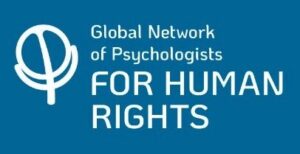Note from the Editors: The website of the Global Network of Psychologists for Human Rights (GNPHR) contains articles, events and news about the domain where psychology and human rights intersect. The information presented in this Bulletin is gathered from many sources and reflects many opinions. The publication of information does not imply that the GNPHR as a network, the GNPHR Steering Committee as a committee, or the individual subscribers share the views and beliefs expressed. The goal of the many opinions expressed is to stimulate reflection, discussion, and informed dialogue.

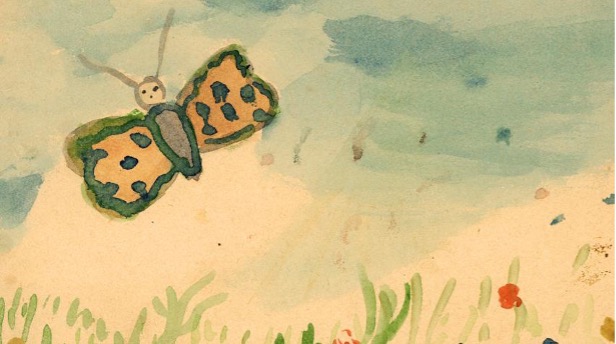
SPECIAL FOCUS in this month’s Bulletin is on the International Day of Commemoration in Memory of the Victims of the Holocaust, January 27. This day marks the anniversary of the liberation of Auschwitz-Birkenau, the largest Nazi death camp.
Human Rights Day 2023. Commemorating the 75th Anniversary of the Universal Declaration of Human Rights. December 10.
International Day of Persons with Disabilities. December 3. Read the story by Serena Wadhwa.
Table of Contents
SPECIAL FOCUS: International Day of Commemoration in Memory of Victims of the Holocaust
SPECIAL SECTION
SPECIAL FOCUS:
The International Day of Commemoration in Memory of the Victims of the Holocaust
UN Outreach programme on the Holocaust
2024 Observance of the International Day of Commemoration in Memory of the Victims of the Holocaust
The memorial ceremony takes place on Friday 26 January 2024 from 11 a.m. to 12 p.m. EST, in the UN General Assembly Hall, United Nations Headquarters. Survivors of the Holocaust will join speakers who include the United Nations Secretary-General, the President of the seventy-eighth session of the United Nations General Assembly, the Permanent Representative of Israel and the Permanent Representative of the United States to the United Nations. The ceremony will be broadcast live.
To attend in person, register here: https://forms.office.com/e/LDpzWc6WrM?origin=lprLink
Key Documents
- Resolution A/RES/76/250 on Holocaust denial
- Resolution 60/7 on Holocaust Remembrance
- Resolution 61/255 on Holocaust denial
- Report on Combating Antisemitism
- United Nations Strategy and Plan of Action on Hate Speech
Related Programmes, Offices and Associations
- United Nations Outreach Programme on the transatlantic slave trade and slavery
- Outreach Programme on the 1994 Genocide Against the Tutsi in Rwanda and the United Nations
- UNESCO – Education about the Holocaust and genocide
- United Nations Office on Genocide Prevention and the Responsibility to Protect
- International Holocaust Remembrance Alliance
Human Rights
- Protecting Human Rights
- Responsibility to Protect
- United Nations High Commissioner for Refugees
- Universal Declaration of Human Rights
Additional Resources
UNESCO: International Day of Commemoration in Memory of the Victims of the Holocaust
Paying tribute to the victims and survivors of the Holocaust through music, contemporary art and survivor testimonies: commemoration events at UNESCO Headquarters.
25 January 2024 – 9:00 am – 25 January 2024 – 9:00 pm.
Location: UNESCO Headquarters, Paris, France, In-Person.
GNPHR NEWS AND EVENTS
GNPHR Announces New Award
 Education in Human Rights & Psychology Recognition Award.
Education in Human Rights & Psychology Recognition Award.
This award acknowledges outstanding educational materials for human rights education for psychologists. See more and submit a nomination here: Education in Human Rights Award
Psychology Organizations and Human Rights
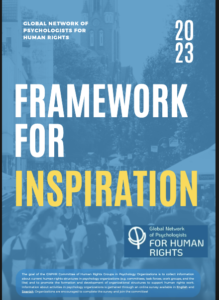
- GNPHR published a guiding document for psychology associations that want to begin or engage a human rights committee / task force / section. Read it here: Framework for Inspiration
- Network Human Rights and Psychology Groups is open to representatives of psychology associations that have established a committee, office, or subgroup focused on psychology and human rights. If you are interested in joining the group please register your interest (1) here; (2) link for the minutes; (3) presentation about human rights and ethics.
- Webinar Series Human Rights Education – Next Webinar: Thursday January 25, 2024. For the past Webinars, see: https://humanrightspsychology.org/webinars/
Join us for a January GNPHR / ICP Webinar
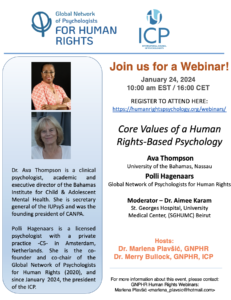 January 24, 2024
January 24, 2024
10 am EST / 4 pm CET
Polli Hagenaars and Ava Thompson
Core Values of a Human-Rights Based Psychology
CONTENT AREAS AND NEWS
General
Call for a United Nations Special Rapporteur on Democracy on the 75th anniversary of the Universal Declaration of Human Rights on 10 December 2023, 20 November 2023
Democracy is under pressure worldwide. That’s why we (Open Society Foundations) endorse an international call for a UN Special Rapporteur on Democracy #UNRoD who will investigate challenges and best practices.
Global reports on the state of democracy and human rights indicate that democracy is threatened and authoritarianism is on the rise. Civic space and freedoms are fiercely and increasingly restricted in many countries. In addition, democratic backsliding or a decline in the quality of democracy is occurring in newer as well as long-established democracies across all regions.
In this situation, the United Nations needs to do more to strengthen human rights and democracy. The undersigned organizations and individuals thus call for the creation of a new mandate by the UN’s Human Rights Council: a UN Special Rapporteur on Democracy (UNRoD).
Children/Youth
Children and Youth
The future of children’s human rights: a call for peace. Editorial, The Lancet, Published Online, November 30, 2023. PDF:
UN figures released on World Children’s Day show that one in five children globally (400 million) are now living in or fleeing from conflict zones. More than 315 000 grave child rights violations were verified between 2005 and 2022. Children are killed, maimed, kidnapped, and denied access to humanitarian aid. They are recruited by armed groups and at risk of exploitation and radicalisation. Children and the facilities they depend on are being targeted by conflict and suffering the collateral damage of war. In Yemen, 250 cases of such violations have been documented in the first 9 months of 2023. In Gaza, the conflict has seen most hospitals destroyed, hundreds of schools damaged, and at least 5500 children killed. In Ukraine, nearly 4000 educational facilities have been damaged or destroyed by the war since February, 2022.
Some Practical Guidelines for Successful Child Mental Health Interventions • Exemplified by a Global Intervention Program. Niels Peter Rygaard, chapter 3 in the PCUN Book Series: Behavioral Science in the Global Arena, Vol 4: “Children of the World – the Future of Our Earth”. Editors: Elaine Congress, Uwe Gielen, Niels Peter Rygaard, 2024.
The chapter intends to inspire designers of mental health educations . It provides an example of how to disseminate and upscale a global intervention program, by adapting it to local strengths, needs, and language, in partnerships with NGOs and government agencies. The program has so far (2023) educated 750 partner staff for six months, using a combination of local startup seminars and online classrooms. Students have trained the high-risk parents and foster parents of some 65.000 children and youth in Alternative Care. (see recording of webinar on this program HERE)
Helping children to process the horrors of war. BPS Communications, 25 October 2023.
The BPS has offered guidance for parents on talking to their children about the conflict in Israel and Gaza. As the conflict in the Middle East continues to occupy front page news, children may be struggling to cope with the videos, images and descriptions of events they are seeing on TV and social media, and discussing in the playground. However, parents and carers may also feel ill-equipped to discuss the war, with its long history and difficult debates.
In response, expert child psychologists from the BPS’s Division of Educational and Child Psychology (DECP) have provided advice to help parents have those difficult conversations and engage with their children’s questions and emotions.
Ending epistemic exclusion: toward a truly global science and practice of early childhood development. Gabriel Scheidecker, Bethlehem Tekola et al., The Lancet, 19 November 2023.
The science and practice of Early Childhood Development (ECD) rely heavily on research from the Euro-American middle class—a minority of the world’s population—and research in or from the majority world is severely under-represented. This problem has been acknowledged in ECD, an applied field aiming to assess and improve child development globally, and in the related fields of global health and developmental sciences.
Thus, now is the time to search for effective pathways towards global representation. To date, most calls for change within ECD and related fields have focused on various aspects of knowledge production and publication.
Congratulations with the Rafto Prize 2023, Defence for Children International-Palestine!
On Sunday 12 November the Rafto Prize 2023 was awarded to Defence for Children International-Palestine (DCIP) for their persistent work to defend and promote the rights of children living in the Occupied Palestinian Territory (OPT). Palestinian children, like other children around the world, have the right to be alive, have the right to be treated fairly, to live and grow up healthy, to be safe, to get education, among other basic human rights.
One violation of human rights does not justify another. Still, we have over the past weeks seen atrocious attacks against civilians in Gaza. Thousands of bombs have dropped where there is nowhere to run and food, medicine, water and fuel has been denied, says Jostein Hole Kobbeltvedt Executive Director of the Rafto Foundation. Director of DCIP Khaled Quzmar held the annual keynote speech at the Rafto Conference digitally this year in the University Aula in Bergen 11 November.
Climate Justice
The 2023 Global Report of the Lancet Countdown. The latest Lancet Countdown report underscores the imperative for a health-centred response in a world facing irreversible harms.
Climate inaction is costing lives and livelihoods today, with new global projections revealing the grave and mounting threat to health of further delayed action on climate change. But bold climate action could offer a lifeline for health. This year’s report launches just weeks before the COP28 which has a health focus for the first time. The findings underscore the opportunity of a lifetime that COP could help deliver – through commitments and action to accelerate a just transition. Without profound and swift mitigation to tackle the root causes of climate change and to support adaptation efforts, the health of humanity is at grave risk.
Our 2023 Report tracks the relationship between health and climate change across five key domains and 47 indicators, providing the most up-to-date assessment of the links between health and climate change.
Explore the key findings of the 2023 report of the Lancet Countdown. Visual summary:
Disability Rights
Aspirations and accommodations for students with disability to equitably access higher education: a systematic scoping review. Paul A. Bartolo, Michelle Borg et al., Front. Educ., Sec. Educational Psychology, Volume 8 – 2023, 23 November 2023. Open Access
Introduction: Several international conventions have recognized the importance of equal access to higher education on the basis of ‘capacity’. However, inequalities persist for various groups. This paper presents a systematic scoping review of studies on the aspirations and access needs of students with disability, medical and mental health conditions to equitably participate in tertiary education.
A search of ERIC, PsycINFO and Web of Science databases identified 133 relevant research articles from across the world covering the experiences of students with all types of disability. These were subjected to thematic analysis.
Three main themes were identified. Firstly, the findings showed that a crucial component of the student higher education experience was the development of their own self-identity, addressing stigma and enhancing self-advocacy skills, autonomy, and career prospects. Secondly, the studies described how students struggled for full membership in the university community, calling for a transformation of university physical, social and teaching environments for them to access and participate in academic and social activities. Thirdly, the analysis showed that students valued individual accommodations in both coursework and assessment.
These findings constitute a newly comprehensive framework for inclusive tertiary education systems and individual accommodations which is grounded in empirical research from a wide variety of contexts. This can serve higher education institutions to develop policy and procedures to ensure equitable participation of students with disability.
Displaced/Migrants/Refugees/Stateless
When Law fails us. The new toughness of migration policy and the loss of the belief that what the law permits and forbids, ultimately still remains significant. Anja Bossow, Verfassungsblog, 24 November 2023.
Last week the United Kingdom’s Supreme Court declared the government’s Rwanda policy – a political agreement to transfer asylum seekers from the UK to Rwanda to have their claims processed and granted there – unlawful. It did so on the narrowest and most solid of legal grounds imaginable: the prohibition of refoulement, ie the return of individuals to a state where they are likely to face torture, cruel, inhuman or degrading treatment or other irreparable harm. This norm is foundational to the international legal regime regulating human migration and universally agreed upon. It was also so obviously breached by the agreement that it felt almost insulting the Court had to spell it out. But it did. And so what? In response, the UK government has declared it will simply legislate the policy’s illegality away by declaring Rwanda a safe third country and/or by exiting various international treaties that oblige it to respect the refoulement principle. To hell with the law and its pesky demands.
Sunak’s bill aims to block UK human rights law to save Rwanda scheme. Rajeev Syal and Kiran Stacey.The Guardian, 6 Dec 2023.
Rishi Sunak aims to block UK human rights laws in an effort to revive the government’s faltering plans to send people seeking asylum to Rwanda.
An emergency bill published on Wednesday will assert that ministers have the power to ignore judgments that come from Strasbourg while stopping short of leaving or “disapplying” the European convention on human rights.
It will, however, seek to disapply relevant parts of the UK’s Human Rights Act in asylum claims.
Speech – European Network of Ombudsmen Conference, European Parliament, November 9, 2023. Sally Hayden
34 years ago, on this exact date, the Berlin Wall fell. 1989 was also the year I was born. It was a time, I believe, when there was huge optimism about the future of Europe and what the EU itself could stand for.
Today, what I see is a reversal of that hope. I see the condoning of gross human rights abuses, hypocrisy from European leadership, and the normalisation of mass death on our borders. I see EU policies that, outside the EU, are propping up dictatorships, militias and other systems that oppress people further, and in the long-term, are increasing the reasons why they need to flee.
Revealed More than 1,000 unmarked graves discovered along EU migration routes. The Guardian,Border graves reporting team, 8 December 2023.Refugees and migrants are being buried in unmarked graves across the European Union at a scale that is unprecedented outside of war.
The Guardian can reveal that at least 1,015 men, women and children who died at the borders of Europe in the past decade were buried before they were identified.
They lie in stark, often blank graves along the borders – rough white stones overgrown with weeds in Sidiro cemetery in Greece; crude wooden crosses on Lampedusa in Italy; in northern France faceless slabs marked simply “Monsieur X”; in Poland and Croatia plaques reading “NN” for name unknown. On the Spanish island of Gran Canaria, one grave states: “Migrant boat number 4. 25/09/2022.”
The European parliament passed a resolution in 2021 that called for people who die on migration routes to be identified and recognised the need for a coordinated database to collect details of the bodies.
Human Rights Education
WHO releases new learning resources to help health workers provide better care and support for women subjected to violence. 22 November 2023. Health workers are often the first, sometimes only, point of contact for the millions of women and girls who experience violence. When equipped with the skills they need, health workers are an essential source of life-saving care and support.
Inclusion, Exclusion, Racism
How to detoxify the politics of migration. The Economist, December 20, 2023. Doom-mongers on both the left and the right are wrong.
Every day, screens around the world fill with grim pictures from Gaza, where nearly 2m Palestinians have been forced out of their homes. Even larger numbers have been displaced in Congo, Sudan, Syria and Ukraine. Most people feel compassion when they see fellow humans fleeing from bombs, bullets or machetes. But many also experience another emotion: fear.
Seen through a screen, the world can seem violent and scary even to residents of safe, rich places. Many worry that ever-swelling numbers of refugees and other migrants will surge across their borders. Nativist politicians talk of an “invasion”.
Fear has curdled rich-world politics. A man who once advocated banning the Koran could be the next Dutch prime minister. Britain’s Conservative Party is trampling on constitutional norms to try to send asylum-seekers on a one-way trip to Rwanda. Donald Trump tells hollering crowds that unlawful immigrants are “poisoning the blood of our country”.
Some perspective is in order. The vast majority of people who migrate do so voluntarily and without drama. For all the talk of record numbers and unprecedented crisis, the share of the world’s people who live outside their country of birth is just 3.6%; it has barely changed since 1960, when it was 3.1%. The numbers forcibly displaced fluctuate wildly, depending on how many wars are raging, but show no clear long-term upward trend. The total has risen alarmingly in the past decade or so, from 0.6% in 2012 to 1.4% in 2022. But this is only a sixth of what it was in the aftermath of the second world war.
Eugenics and the Racialisation of ‘White Eastern Europeans’. Marius Turda, Cultural psychology, December 2023.
In this contribution to the symposium, I use Ivan Kalmar’s book White but not Quite: Central Europe’s Illiberal Revolt to reflect on the connection between eugenics and the racialisation of ‘white Eastern Europeans’, and on the need to engage forcefully with the legacies of eugenics more broadly.
As the scandal surrounding Diane Abbott’s comments on racism only too clearly demonstrated, whiteness matters. Responding to an article published by Tomiwa Owolade on 15 April 2023 in the Observer, in which he suggested that Irish, Jewish and Traveller people are among the most abused people in the UK (Owolade, 2023), Abbott, a black Labour MP for Hackney North and Stoke Newington commented that it was ‘prejudice’ that these groups experienced rather than ‘racism’. Prejudice, she explained, ‘is similar to racism and the two words are often used as if they are interchangeable. It is true that many types of white people with points of difference, such as redheads, can experience this prejudice. But they are not all their lives subject to racism’ (Abbott, 2023).
Colonialism, eugenics and ‘race’ in Central and Eastern Europe. Marius Turda and Bolaji Balogun, Global social challenges journal, 2: 2, 10 Feb 2023, Open access.
The legacies of eugenics in Central and Eastern Europe (CEE) and their connections to global colonialism remain uncharted. Therefore, it is worth pondering over this relationship, which requires a historical perspective and a repositioning of the recent postcolonial ‘turn’ in CEE to include the history of eugenics. For the most part of the 20th century, eugenics took shape within both colonial and nation-building projects. Eugenic strategies devised to preserve the colonial system outside Europe have always coexisted with programmes designed to improve the well-being of nations within Europe. This convergence between colonial, racial and national dimensions of eugenics requires a critical rethought. While this key line of inquiry has been a major focus in Western Europe and the US, it remains under-theorised in CEE. By highlighting the colonial implications of nation-building in the region, we attempt to destabilise the all-too-pervasive historiographic misconception that CEE nations are largely untouched by the global circulation of eugenics and scientific racism.
‘Eastern Europeanism’: A Rethinking of ‘Race and Racism’ by and Against White People from Central and Eastern Europe. Bolaji Balogun, Cultural sociology, 2023.
Rethinking ‘nativism’: beyond the ideational approach, George Newth, Identities (2023) 30(2) 161-180.
Existing ideational approaches to nativism tend to conflate the concept with nationalism, xenophobia and populism, as well as overlooking the role of racism and racialisation in the process of constructing the non-native ‘out-group’, against the native ‘in-group’. Inspired by the Discourse Theoretical approach to populism, this article offers a significant conceptual contribution to studies on the far right by interpreting nativism as a racist and xenophobic discourse structured around an exclusionary vision of the nation. This conceptualisation helps identify how xenophobia, nationalism, racism and racialisation all contribute to nativist discourse, how nativism can be clearly demarcated from populism, and how nativist arguments can be articulated by parties beyond the far right.
Mental Health and Human Rights
Mental Health, human rights and legislation. Guidance and Practice. Gabriele Rocca. WAPR Bulletin Nº 51, December 2023.
A very important event took place on the 9. October 2023: The presentation of the “Mental Health, human rights and legislation. Guidance and practice” document co-published by the World Health Organization and the United Nations (on behalf of the Office of the United Nations High Commissioner for Human Rights). The joint participation of these two bodies underlines the relationship between mental health and human rights, and the need to create mental health systems capable of responding to population needs.
The Convention on the Rights of Persons with Disabilities (CRPD) clearly defined the boundaries within which legal relationships between citizens and institutions should be established: everyone (including people with disabilities) has the right to access high-quality care and support without discrimination or the violation of any of their human rights. With the aim of establishing mental health systems that are capable of providing person-centered care, the Guidance reaffirms these values and suggests operational models to promote personal autonomy and remove the barriers obstructing access to the full rights of citizenship. The implementation of rights-based mental health systems requires de-institutionalization, the ending of coercive practices, and the promotion of supported decision making. It furthermore requires community inclusion, and full participation in all aspects of life. It is emphasized that this requires action not only in terms of health care interventions, but also economic and social policies that commit governments, institutions and agencies to supporting them. Cross-sectoral reform is needed to activate all community resources, influence the social determinants affecting well-being, and create mental health services that are not limited to health care.
Peace / Violence and War
Initiatives of Change International. Trust: A Foundation for Lasting Peace
80% of humanitarian crisis are conflict-related – The World Bank
Where trust is lacking, polarisation tears communities apart. It fuels inequality, and even seemingly minor disagreements can escalate into wide-scale violence. Our Trustbuilding Program helps communities in conflict reconcile and create lasting peace from the ground up. We equip local trustbuilders. We train local trustbuilders and give them tools to reconcile conflict and heal historical wounds.
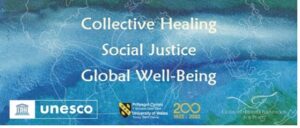 Inspired by UNESCO’s medium-term (2022-2029) priorities (e.g. Africa, gender equality, and youth empowerment), and committed to the UN Decade of People of African Descent (2015-2024), the overarching aims of the Collective Healing Initiative are: to break the silence about historical brutality of slavery, colonialism, genocide and continued structural violence; to confront socio-economic deprivation, exclusion, and vulnerability; to challenge gender inequality, social injustice, and structural racism; to address intergenerational trauma and ill-being; to advance politics of dignity towards social transformation.
Inspired by UNESCO’s medium-term (2022-2029) priorities (e.g. Africa, gender equality, and youth empowerment), and committed to the UN Decade of People of African Descent (2015-2024), the overarching aims of the Collective Healing Initiative are: to break the silence about historical brutality of slavery, colonialism, genocide and continued structural violence; to confront socio-economic deprivation, exclusion, and vulnerability; to challenge gender inequality, social injustice, and structural racism; to address intergenerational trauma and ill-being; to advance politics of dignity towards social transformation.
These objectives draw on updated knowledge of the interconnection between collective healing, social justice and global well-being. Ongoing research highlights that collective healing can contribute to “de-racialising” our vision and “decolonising” our conception of humanity. It does so by deconstructing racist discourses and ideology, recognising and addressing the harms of slavery’s legacies, transcending the antagonism of ‘us-vs-them’ mentalities, and co-envisaging a common future for all. More importantly, it can help communities (re)discover the gifts of (indigenous) knowledge, wisdom and practices, and enrich our collective resilience, well-being and co-flourishing with nature.
GAZA
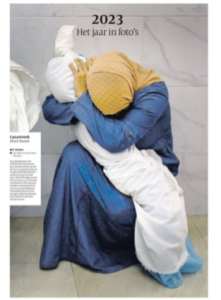 ‘You made me do it’. on violence and its origins. London review of books. Jacqueline Rose’s The Plague – Living Death in Our Times, Vol. 45 No. 23, 30 November 2023.
‘You made me do it’. on violence and its origins. London review of books. Jacqueline Rose’s The Plague – Living Death in Our Times, Vol. 45 No. 23, 30 November 2023.
Palestinian and Israeli Teens Swam in the Same Pool. Then Came Oct. 7. Miriam Jordan, NY Times, November 15, 2023. Reporting from Jerusalem
The teenagers in the Greater Jerusalem swim club made a point of not focusing on their differences. That changed with the war.
The rule was unspoken, but the Israeli and Palestinian teenagers in the Greater Jerusalem swim club had abided by it forever without even thinking. No politics in the pool.
They lived on opposite sides of Jerusalem, coming together six afternoons a week to train in lanes reserved for their team at the Y.M.C.A. After two hours of laps, they plunged into a Jacuzzi, where they joshed for a few minutes before calling it a day.
They swam together, went on beach outings together, barbecued together. The best Jewish swimmers represented Israel in international meets. The best swimmers from East Jerusalem competed for a team comprising Palestinians at meets in the Arab world.
“We don’t think about the team as Israelis and Palestinians,” said Avishag Ozeri, 16, an Israeli swimmer who recalled being taught to swim by a Palestinian from East Jerusalem.
“It is so normal to be together,” she said before a recent practice. “It’s weird even talking about it.” But then came the Oct. 7 Hamas-led attacks, the Israel bombardment of Gaza that followed, and a series of social media interactions that would test the team’s unspoken rule.
Swimming Together, ‘Just Human Beings’
The swimmers train at the Y.M.C.A., a Christian nonprofit open to people of all faiths, in the heart of Jewish West Jerusalem, and Emanuel May has been the team’s volunteer coach for years. An experienced coach with a gentle demeanor, May, 70, was raised in a farm collective, known as a kibbutz. Although he has trained champion swimmers, he said his passion was not to produce winners. It’s to foster unity among young people in Jerusalem, a city where Israelis and Palestinians regularly interact in the daily life of shops, restaurants and university classrooms but remain divided by festering conflict. “The spirit here is to swim together, just human beings,” he said.
GAZA: 3,195 children killed in three weeks surpasses annual number of children killed in conflict zones since 2019. Save the children, RAMALLAH, 29 October.
The number of children reported killed in Gaza in just three weeks has surpassed the annual number of children killed across the world’s conflict zones since 2019, Save the Children said.
The Palestinian Counseling Center was founded in Jerusalem in 1983 by a group of psychologists, educators and community activists, as an Ottoman institution, to work with all members of the Palestinian Society exposed to political, social, economic, and psychological prejudice and violence in order to support and develop the psychosocial concepts of services in Palestine. The PCC today has branches located in Jerusalem, Ramallah, Nablus, and Qalqilya. Through these branches, the PCC works to reach all the Palestinian areas in order to provide full positive psychosocial services which include counseling, hoping to prevent the development of psychological issues through providing educational social services, capacity building, providing consultations to organizations and workers in the health sector, lobbying and advocating for policies and legislations which support the right to reach a level psychosocial point in Palestine, in addition to opposing the Israeli Occupation’s attack on our society and nation being the main reason behind the deteriorating mental health in Palestine.
How can I, as a leftwing Jew, show support for both Palestinians and Israelis? Jon Lansman, The Guardian, 20 Nov 2023.
My sympathy is for the people, not the politicians. It should not be so hard to make that clear.
To speak out as a leftwing Jew on any aspect of this century-old conflict is to risk isolation and hate from both sides. That much I know, having directed Jeremy Corbyn’s leadership campaigns and called out the antisemitism of that period. So, on 8 October, absorbing the emerging details of the Hamas massacre the previous day, I feared the consequence of speaking out again.
It turned out that in such circumstances I could not have been in a more supportive place during the Labour party conference than at a joint-faith meeting organised by a Jewish and Muslim women’s group in a Liverpool synagogue. Grief shared in such a setting was great comfort and some relief for all of us together – Muslims and Jews.
Why a Gaza Invasion and ‘Once and for All’ Thinking Are Wrong for Israel. Thomas L. Friedman, NY Times, Oct. 16, 2023.
When The Times’s Israel correspondent Isabel Kershner recently asked an Israeli Army tank driver, Shai Levy, 37, to describe the purpose of the looming Israeli invasion of Gaza, he said something that really caught my ear. It was “to restore honor to Israel,” he said. “The citizens are relying on us to defeat Hamas and remove the threat from Gaza once and for all.”
That caught my ear because, over the years, I’ve learned that four of the most dangerous words in the Middle East are “once and for all.”
All these Islamist/jihadist movements — the Taliban, Hamas, ISIS, Al Qaeda, Palestinian Islamic Jihad, Hezbollah, the Houthis — have deep cultural, social, religious and political roots in their societies. And they have access to endless supplies of humiliated young men, many of whom have never been in a job, power or a romantic relationship: a lethal combination that makes them easy to mobilize for mayhem.
Women
Societies that treat women badly are poorer and less stable. Oppressing women not only hurts women; it also hurts men. Basra and Tororo, The Economist, Sep 11th 2021.
INDIA’S DAUGHTERS. Chapter 5: An Unlikely Escape Route. Emily Schmall, Amanda Taub, Shalini Bhagat, NY Times, November 18, 2023.
Here was the paradox of being a woman in modern India. Sometimes a path from the oppression of patriarchy was marriage to a man willing to help challenge that system.
OPPORTUNITIES
UPCOMING EVENTS
Ava DuVernay Wants Her Film “Origin” to Influence the 2024 Election. David Remnick, THE NEW YORKER, January 5, 2024.
The celebrated filmmaker is back with a challenging movie intended to provoke a political response. Plus, the subject of a January 6th conspiracy theory speaks out.
The filmmaker Ava DuVernay has a reputation for tackling challenging material about America’s troubled past with such works as “Selma” and “When They See Us.” “Origin,” her adaptation of Isabel Wilkerson’s best-seller “Caste: The Origins of Our Discontents,” may be her most ambitious undertaking to date. “This breaks every screenwriting rule, every rule of filmmaking that I know,” DuVernay tells David Remnick. Plus, the journalist John Nichols discusses what it’s like to be drawn into a January 6th conspiracy theory, and former President Trump’s legal defense in the federal case against him.
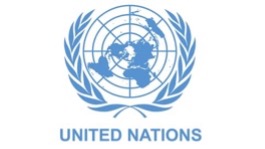 You can follow the meetings of the Human Rights Council by the United Nations Web TV:
You can follow the meetings of the Human Rights Council by the United Nations Web TV: Exhibits, Events, Courses, Calls for Papers
Psychologists in advocacy and policy-making
Psychologists’ education and professional expertise provide them with a deep understanding of issues such as poverty, unemployment, health disparities, violence, immigration, racism, and broader social injustices. This equips them to bring valuable insights to policy and decision-making. However, only a minority of psychologists actively participate in driving change. Our aim is to better understand the potential roles psychologists could play in policy-making and support their engagement by addressing their specific needs.
We invite you to contribute to this analysis with your own views and experience. This invitation stands whether you have already been involved in advocacy work, have only considered the idea, or have never seen yourself as an “agent of change”.
In the context of our project, we define advocacy as any action taken in support of social change, spanning from the group or community level, to organisational sphere and, ultimately, to governmental rules and regulations.
This initiative is developed under the American Psychological Association’s Global Psychology Learning Leadership Institute (LLI).
Please contact grigorean.emilia01@gmail.com should you have any questions related to this form.
We are grateful for your contribution!
Ana KRALJEVIĆ, Doga AVSEVEN & Emilia GRIGOREAN
PUBLICATIONS
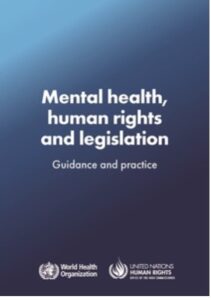 Mental health, human rights and legislation: guidance and practice. World Health Organization & United Nations. Office of the High Commissioner for Human Rights, 9 October 2023.
Mental health, human rights and legislation: guidance and practice. World Health Organization & United Nations. Office of the High Commissioner for Human Rights, 9 October 2023.
Mental health is growing as a public health priority and human rights imperative, and an increasing number of countries are wishing to adopt or reform legislation related to mental health. However, laws on mental health, currently often fail to address discrimination and human rights violations including in mental health care settings. In order to support countries in this area, the World Health Organization and the Office of the High Commissioner for Human Rights have jointly developed the publication entitled “Mental health, human rights and legislation: guidance and practice”.
 The Handbook of Social Justice in Psychological Therapies. Power, Politics, Change. Edited by: Laura Anne Winter – University of Manchester, UK and Divine Charura – York St John University, UK.
The Handbook of Social Justice in Psychological Therapies. Power, Politics, Change. Edited by: Laura Anne Winter – University of Manchester, UK and Divine Charura – York St John University, UK.
This three-part book sets out the core principles for social justice in the psychological therapies. In Part 1 you’ll be introduced to Social Justice Theory in the psychological therapies, covering identity and intersectionality and integrating the psychological and socio-political.
In Part 2, you can expand on your knowledge with Social Justice informed therapeutic practice, which looks at the ways in which social class, race, disability, and other minoritised identities can inform therapeutic practice.
In Part 3, you will look Beyond the therapy room, and explore how to apply your social justice knowledge to clinical supervision, community psychology and other non-traditional therapeutic models.
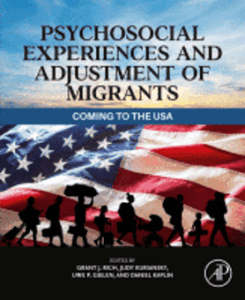 Psychosocial Experiences and Adjustment of Migrants. Coming to the USA. Grant J. Rich, Judy Kuriansky, Uwe Gielen, Daniel Kaplin, Elsevier, 2023
Psychosocial Experiences and Adjustment of Migrants. Coming to the USA. Grant J. Rich, Judy Kuriansky, Uwe Gielen, Daniel Kaplin, Elsevier, 2023
Psychosocial Experiences and Adjustment of Migrants: Coming to the USA explores the emotional experiences of migrants seeking to come to America, including psychological sequelae of such relocation from one’s home country to another country. This book is divided into three main parts. The first introduces the reader to the foundational principles of migration. Next, the chapter authors review individuals and families who come to the United States through “orderly” migration, profiling the experiences of immigrants from various countries and regions. The next set of chapters discuss “forced” migration, examining the relative impact of social and legal challenges and the psychological impact. The book wraps up with research, advocacy and mental health and social services options for migrants.
CONTACTS: Published by the Global Network of Psychologists for Human Rights – www.humanrightspsychology.org
Disclaimer: The website of the Global Network of Psychologists for Human Rights (GNPHR) contains articles, events and news about the domain where psychology and human rights intersect. The information presented in this Bulletin, does not imply that the GNPHR shares the views and beliefs in the articles.
- @GNPHR1
- How to get involved – read how you can contribute to the global network
- Consider contributing a Blog/Commentary
- News and Bulletins from the GNPHR – Subscribe to GNPHR
- Email addresses:
Ways to Participate in Global Network Activities
- Student/young person representation on the GNPHR Steering Committee
Are you a student or young person (under 35 years of age) interested in joining the GNPHR Steering Committee? The GNPHR invites applications. Role description: The terms of reference broadly define the roles of all members of the steering group. Individual steering committee member tasks include : Each member will take responsibility for one of the following: (a) A specific content area or group of areas; (b) A specific project (e.g. survey of human rights reporting mechanisms; survey of educational programs in psychology/human rights, etc); (c) A specific function: for example, organizing a newsletter; soliciting commentary or newsletter blogs; seeking grant possibilities; outreach to general human rights organizations; outreach to psychology organizations or (d) Consultation: Working in collaboration with other organisations where there is a specific issue. In addition, from time-to-time, short-term subgroups may work on specific projects. In addition, for the student member, there would be a specific remit to liaise with other organisations that are focussed on younger people, psychology and human rights. Click here if you are interested in being nominated. - Share Your Experiences and Examples
One of the best ways to illustrate the intersection of psychology and human rights is through example. We are looking for examples of your encounters with human rights issues in your professional life. You might describe a time when you protected (or failed to protect) human rights, or advocated for what you saw as a human rights issue. The events might be in your clinical, research, academic, applied, or volunteer work. Please send your narrative / story (500-1000 words) to Marlena Plavšić (marlena_plavsic@hotmail.com). We will compile these for publication in the GNPHR Bulletin and on the website. Please also indicate if you would like your stories to remain anonymous. - Share your Expertise and Opinions
We invite you to contribute a blog or opinion piece on general human rights issues; human rights education or strategies for raising the profile of human rights within psychology or your professional life. Students are welcome to contribute, including on student needs for learning about and addressing human rights. Please contact the GNPHR Blog editor (blogeditor@humanrightspsychology.org) with ideas for the article you would like to write! - Send articles/news/events
If you come across a human rights article or news, or know of an upcoming hunman rights event, please send for publication in the Bulletin. Send to the Bulletin editor Polli Hagenaars (polli.hagenaars@gmail.com).


